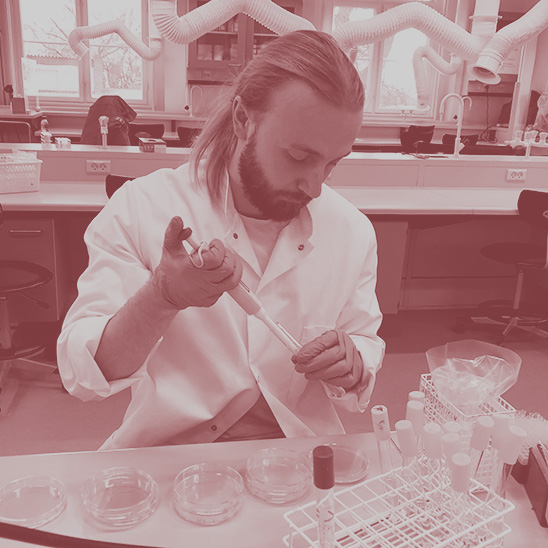Push innovation within the food industry forwards
Introduction
With a Master’s degree in International Food Quality and Health you will have a firm grasp of the journey of food products from farm to fork. Through the programme you will gain an understanding of the food chain across different disciplines by immersing yourself in subjects such as sustainable food production, food safety, food quality, nutrition and marketing for the international market.
The growing population and improved welfare of the world call for an unprecedented focus on sustainability and resource-efficient food production as well as the ability to meet a growing demand for high-quality food products – nowhere more so than in China. As the income of Chinese consumers rises, so does the demand for greater quality, convenience and safety in food. Hence, the Chinese food industry is investing heavily in technology and has a great demand for innovation and know-how in order to be able to meet the needs of the population.
The global market for food and food technology is growing rapidly, and the Danish food industry has a unique opportunity to maintain and strengthen its position as an innovator and a supplier of high-quality products.
As a graduate of International Food Quality and Health you will be able to meet these needs of the food industries, especially within the companies focussed on expanding their markets beyond Danish and European borders towards Asia and China in particular.
The programme teaches you to initiate, manage and implement food-related development projects, and you will acquire strong competences within food development and innovation in relation to Western and Asian food-related projects.
On completion of the programme, you receive a double degree and the following titles: Master of Science in International Food Quality and Health from Aarhus University and Master of Science in Food Safety and Health from the University of Chinese Academy of Sciences.

Place of study
The programme is carried out at SDC, at Yanqihu campus north of Beijing, and you must (as the general rule) be in China for the entire duration of your studies.
Programme Structure

With respect to the food chain view of the programme, the first semester introduces the areas of food production and analysis, food safety, hygiene and risk management, moving up the chain to food quality and eating of food products in cross-cultural contexts. You attend five focussed course modules:
• Food Production Environment and Quality (5 ECTS)
• Modern Food Analysis (5 ECTS)
• Food Fermentation and Processing (5 ECTS)
• Microbial Food Safety and Hygiene (7.5 ECTS)
• Food Quality, Perception and Eating Behaviour (7.5 ECTS)

The second semester focusses on food issues such as toxicology and chemical safety on to economic chain management, business and marketing to food and its societal implications in cross-market contexts. In the second semester you will also deal with the impact of the food chain on nutrition and health. The semester comprises six course modules:
• Food Toxicology (3.75 ECTS)
• Chemical Food Safety and Health (3.75 ECTS)
• Food Nutrition and Health (7.5 ECTS)
• Food Chain Management (5 ECTS)
• Food and Society (5 ECTS)
• Food Business Marketing and the Consumer (5 ECTS)

You complete the programme by spending the third and fourth semesters designing, carrying out and completing your research-based thesis. Here you have the opportunity to immerse yourself in a specific area or synergy of areas of the food chain such as a food quality-, food safety-, food management-, health- and/or marketing-relevant subject.

The thesis will typically be conducted as part of an internship in a food company or at a university, aiming for you to get practice-oriented experience. You are provided with guidance and a unique academic perspective by a Danish as well as a Chinese supervisor.
Courses may be subject to change.
The programme consists of five modules of a total of 11 courses. Commonly every module: 1) holds an introductory session designed to give students, who may have different academic backgrounds, a basis from which to launch an understanding of the content of the courses, and 2) synergistic involvement of Danish as well as Chinese teachers to support learning about cross-cultural differences.
The primary approach is problem-based learning, which means that focus is on real-world issues and applicable scenarios, which you identify, analyse and solve under supervision.
News
Get ready for the food market of the future
The MSc in International Food Quality and Health equips students to develop the food market of the future across China and Denmark.Read more

The first International Food Quality and Health students graduate
The first cohort of students that joined the International Food Quality and Health Master’s degree programme in 2020 have graduated.Read more
Can people eat black soldier fly larvae fat?
Søren Valsøe Hansen researched the microbial food safety of fat from the black soldier fly larvae to assess its potential as foodstuff, in his thesis.Read more

Career
As a graduate of the programme, you will hold a strong international profile and have a profound understanding of:
• Food quality issues from health, nutrition, sensory, marketing, economic and intercultural perspectives
• Unprocessed food, food processing, food supply and safety, including microbial safety
• Risk assessment and management methods and quality control of food
• Intercultural consumer behaviour and eating practice differences
• Food supply nationally and internationally linked to Asian and Western markets and their needs
Your key competence is your broad understanding of food quality from health, nutrition, sensory, marketing, economic and intercultural perspectives for production, process and market optimisation purposes in the food industry. This understanding gives you the skills to analyse a problem, compose a relevant solution and initiate, implement and evaluate the solution.
A degree in International Food Quality and Health prepares you to work cross-culturally in a variety of fields such as food quality, safety, nutrition and health in food supply. Career options include positions in small to very large food companies, especially companies that focus, or will focus, on emerging markets, export or production between the Western and Asian markets.
You may find employment in job functions such as project management, research development, operation, sale, consultancy and advisory functions. Also, in the public sector you will find relevant functions related to the development of policies, teaching, implementation and control.

Attractive Candidates
’Experience with working across cultures, knowledge of the entire food chain and the courage to think out of the box. We attach great importance to these competences, which I am convinced Masters of International Food Quality and Health will possess’.
Anne Louise Mørkbak, Director of Global Nutrition at Arla Foods
‘China is one of Danish Crown’s main markets. We have seen a significant growth in sales in recent years, and it is important for us to continue to maintain and strengthen our position in this market. Masters in International Food Quality and Health familiar with Chinese business culture are in high demand here’
Søren Tinggaard, Vice President, Pork Export Strategy & Marketing Export, Danish Crown A/S
’To Orana, a born global food manufacturer with subsidiaries in several developing countries, it is an obvious advantage if the students not only have a strong professional background in food production, but also a sense of cross-cultural differences both from courses and practical experience’
Niels Østerberg, Director, Orana A/S


Contact Alumni
If you have further questions, please take a look at the FAQ on the Going to study in China page.
For questions regarding specific courses, admission or practical matters please contact SDC at: admission@sdc.university
For first-hand questions regarding studying at SDC, you may contact recent International Food Quality and Health graduate Chanette Frederiksen at chanette1995@hotmail.com.
Due to the COVID-19 pandemic, unfortunately, Chanette was not able to go to China and hence took the full program online. She does not represent SDC, but will answer your questions on the basis of her own personal experiences.

Heads of the Programme
Danish Head of International Food Quality and Health
Professor Derek V. Byrne
Department of Food Science – Food Quality Perception & Society
Aarhus University
Contact
Assistant Professor
Barbara Vad Andersen
Email: barbarav.andersen@food.au.dk
Chinese Head of International Food Quality and Health
Professor Cui Yanshan
College of Resources and Environment
University of Chinese Academy of Sciences
